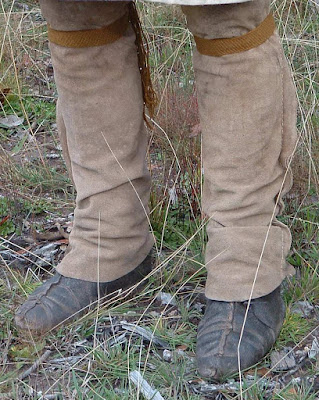Leather Leggings
Documentation Pre 1770. NOTE: Wash-leather was an 18th century term
for brain tanned leather. https://www.academia.edu/11291281/Fur_and_Leather_Garments_in_18th_and_19th_century_New_England
The entwined gift-giving customs of British royalty and Native chiefs
were also demonstrated at Johnson Hall by giving leather gloves to mourners at
funerals. On April 28 of 1759, Johnson picked up “106 pair Mens Gloves,” “36
ditto Womens”
And “13 Pair White Mans Gloves” from supplier Daniel Campbell.
On the following day, he paid the debts of his deceased Mohawk ally Peter, and billed
his Indian expense account 30 pounds for the making of “600 pr. Of Indn.
Stockings [leather leggings] wt. Ribbn. To them” so the mourners could be
arrayed in their finest Mohawk dress. (33)
In colonial New England, Indian brain-tanned or oil-dressed
deerskin or
“buckskin” was often given the name “wash-leather”
due to its softness and ease of cleaning. Deerskin, after
brain-tanning, kept its natural color, a pleasing shade of ivory, and could be
dyed into darker colors. Local deerskin was plentiful and reasonably priced –
in Hadley, Massachusetts in 1770, for example, skins measuring 12 square feet
sold for an average of 14 shillings each, at a time when imported cottons sold
for 25shillings a yard. Venison – deer meat – was only about 2 pence a pound.
One deerskin would provide enough leather for half a pair of breeches, or four
to five pair of gloves or mittens. Throughout the 18th century, in
the Connecticut River valley, “
Breeches were the most common garment made of deer’s leather,
jackets or waistcoats were numerous; there were leather doublets and coats, and
some had a leather suit. A few had wash-leather stockings, and many had deer
skin gloves. Moccasons were made of deer’s leather and moose leather.”(23)
https://www.academia.edu/11291281/Fur_and_Leather_Garments_in_18th_and_19th_century_New_England
1767 "...the boy had nothing on him that was ever spun. He had
buckskin leggings, moccasins, and breechclout, and a bear skin dressed with the
hair on, which he belted about him, and a racoon skin cap." (Remarkable
Occurences in the Life of James Smith..., p. 117)
My thanks to Sicilianhunter for this last documented quote.
Keith.
